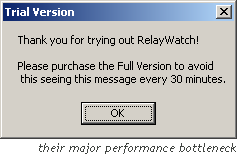We've all exaggerated on our resumes at one point or another. Maybe it was describing the role on a one-man project as the "project manager who successfully led the development team through all phases of the software lifecycle." Maybe it was saying that the laughable attempt at creating a computer game at age fourteen with a bunch of friends was "being the founder and CEO of Nuwosoft." Or maybe it was something else; it's just how the game is played.
Most employers know this and have a knack at bringing these carefully worded embellishments back to reality. As an interviewer, an employer, and a bit of a sadist myself, I'll often have a fun time doing this. Especially when the candidate misspells the technology he's claiming expertise in:
I see here that you're an expert with CMO / DCMO / and CMO+. Can you tell me how you've used these technologies in your past projects?
Well, I wasn't a full-time CMO programmer; I mostly programmed in VB5 or VB6. But I am very familiar with CMO.Can you tell me what the relationship between CMO and Visual Basic is?
Well, it's a programming language, and the difference is like the difference between VB and C++: both languages have "if," "loops," "variables," and all that, but you just write them up differently.Can you tell me what CMO stands for?
Hmm ... well, who can remember all of these acronyms? I've forgotten, but what matters it that I know CMO!Spoiler: COM (Component Object Model) is a platform that allows programmers to build libraries in virtually any language that can be called from virtually any other language.
I'm glad to see I'm not the only one who enjoys this. Z. Bonham was interviewing a candidate and noticed that "improved application performance by 50%" was a big, bold bullet point right at the top of his resume. Z thought he'd have some fun asked a barrage of questions:
How did he arrive at the number 50%? How was performance being measured? What tools did he use? What was the single most contributing bottleneck?
Z expected to see a deer in the headlights; complete shock; a symphony of "uhhhhs" and "ummms." Surely, no one had ever asked about that one before! To Z's surprise, the candidate eagerly explained.
The candidate recently flew to an overseas client site to help debug a serious problem. Just as the client described, their product would work for about 30 minutes and then fail miserably. After a bit debugging, he discovered that there was a modal dialog box on the server that was blocking the component from running.
 It turned out that modal dialog was originating from a trial version of one of the third-party components. It only allowed for 30 minutes of usage before prompting the user to purchase the software. The candidate explained this to the operations team and asked them to send him the purchase key. Instead, he was met with: "Oh, sh*t! We forgot to deploy the PFB application!"
It turned out that modal dialog was originating from a trial version of one of the third-party components. It only allowed for 30 minutes of usage before prompting the user to purchase the software. The candidate explained this to the operations team and asked them to send him the purchase key. Instead, he was met with: "Oh, sh*t! We forgot to deploy the PFB application!"
The candidate was a bit confused and asked, "What PFB application? I've never heard of it."
"It's the Press the Freaking Button one. That gets us around the licensing of the software and runs on a schedule to look for that dialog and 'click' it."
In disbelief, the candidate packed his bags and headed back home to strongly recommend that they begin using the registered version of the software. The operations lead refused because, as he saw it, they had a perfectly acceptable 'workaround' to the trial software.
And that was what inspired the candidate to update his resume and began a job search.
While Z didn't end up hiring that candidate, he sure did give him some bonus points for the best definition of "increasing application performance by 50%."

